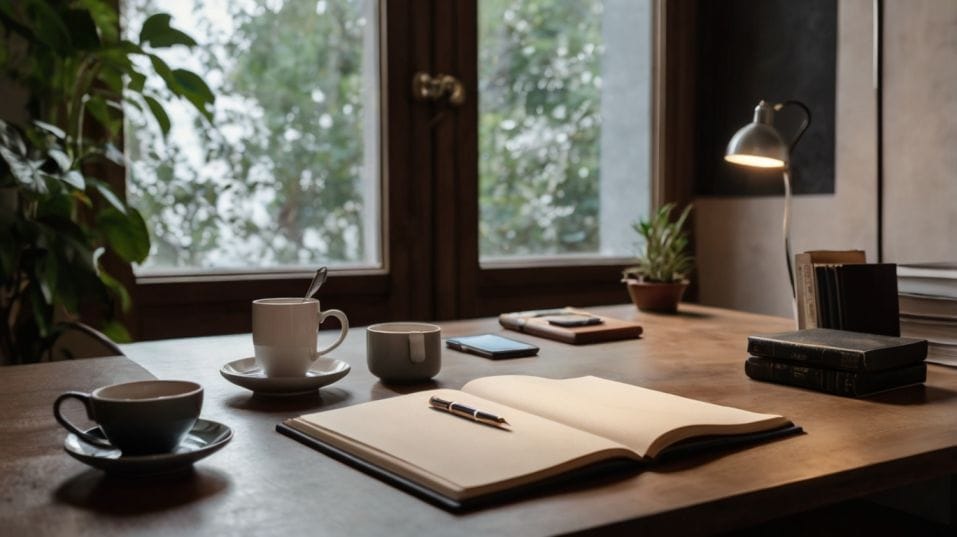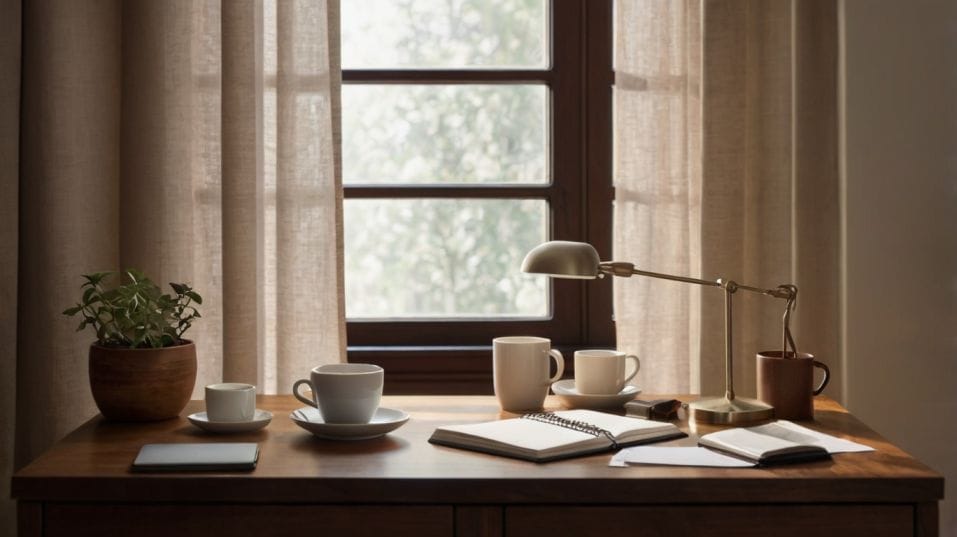Why a Tidy Desk Supports Mindful Thinking
A cluttered desk fuels distraction and stress. Learn how a tidy workspace sharpens focus, reduces mental overload, and supports mindful thinking.

Do you ever sit down to work and feel mentally drained before you even begin? The state of your desk might be influencing your focus more than you realize.
A cluttered workspace isn’t just an eyesore—it actively competes for your attention, increasing stress and making deep work harder.
Research shows that mess overloads the brain, draining cognitive energy. But what if a clean, intentional workspace could do the opposite? Let’s explore how decluttering can sharpen your thinking and boost productivity.
The Psychology of Clutter
Clutter isn’t harmless background noise—it’s a cognitive burden. Studies in neuroscience reveal that excess visual stimuli overload the brain, forcing it to process irrelevant information.
This divided attention reduces efficiency, increases stress, and makes decision-making harder. In fast-paced work environments, that mental drain adds up quickly.
Clutter and Stress
Mess also has an emotional cost. Neuroscientists have found that cluttered spaces trigger cortisol spikes, subtly elevating stress levels throughout the day.
If you’ve ever felt overwhelmed before even starting a task, your workspace might be nudging you toward burnout.
The constant exposure to visual chaos can make it difficult to relax, leading to a feeling of perpetual mental clutter that extends beyond the desk.

Clutter and Procrastination
Clutter is also linked to procrastination. When your desk is in disarray, it can create subconscious resistance to starting tasks, as your mind perceives the environment as chaotic and uninviting.
A clutter-free space, on the other hand, signals readiness, reducing mental friction and making it easier to dive into work without hesitation.
Clutter and Working Memory
Beyond stress and procrastination, clutter also reduces working memory capacity. When the brain has to process unnecessary stimuli, it has fewer resources available for problem-solving, planning, and deep thinking.
By eliminating clutter, you free up cognitive bandwidth, allowing you to perform tasks with greater efficiency and ease.
A Clear Space for Clear Thoughts
A tidy desk isn’t just pleasing to the eye—it creates psychological relief. Clean spaces signal to the brain that it’s time to focus, reducing the background mental static that clutter creates.
The result? Sharper thinking, faster decision-making, and a greater sense of control over your workday.
Minimalism and Efficiency
Minimalism in your workspace isn’t about aesthetics; it’s about efficiency. Fewer distractions mean less cognitive effort wasted on filtering out irrelevant details.
In high-pressure settings where sustained focus is crucial, an uncluttered environment gives your mind the breathing room it needs.
Organization and Creativity
Beyond productivity, a well-maintained desk can also enhance creativity. Many professionals assume that creativity thrives in chaos, but research suggests the opposite.
A clean, structured space allows the brain to make clearer connections, fostering innovative thinking without the mental drain of disorganization.
The simple act of decluttering can create a sense of mental space, allowing new ideas to flow more freely.
Clutter and Decision Fatigue
A clear workspace also affects decision fatigue. When surrounded by clutter, the brain must continuously make micro-decisions—where to place things, how to navigate the mess, whether an item should stay or go.
Over time, this depletes mental energy. A well-organized desk reduces these unnecessary decisions, preserving mental stamina for more important tasks.
Crafting a Mindful Workspace
A well-organized desk isn’t just about removing clutter—it’s about creating an environment that supports focus, efficiency, and a sense of calm.
A mindful workspace sets the stage for better habits, helping you transition smoothly into deep work without unnecessary distractions.
Keep Only Essentials in Sight
Everything else belongs in a drawer, shelf, or digital archive. Less clutter means fewer distractions competing for your attention.
Adopt a Reset Ritual
Spend two minutes at the end of each day clearing your workspace. A fresh start each morning reduces mental friction.
Organize with Intention
Use drawer dividers, cable management tools, and document trays to maintain order effortlessly.
Go Digital When Possible
Scanning documents and using cloud storage cuts down on paper clutter, a major source of desk disarray.
Incorporate Calming Elements
A small plant, a minimalist desk setup, or a single inspiring object can reinforce focus and mindfulness.
Use Sensory Cues to Enhance Focus
Scented candles, soft lighting, or a designated workspace playlist can help reinforce a sense of calm and concentration.
Leverage Ergonomics for Mental Clarity
A well-arranged workspace, with a comfortable chair, an eye-level monitor, and proper lighting, can reduce physical discomfort, which in turn supports mental focus and stamina.
Implement a One-Minute Rule
If something can be organized or put away in under a minute, do it immediately to prevent clutter buildup.
Set Workspace Boundaries
Designate specific areas for different types of work—one zone for deep focus, another for brainstorming or meetings—to mentally separate tasks and maintain organization.
The Ripple Effect of an Ordered Desk
A tidy workspace extends beyond aesthetics—it creates a foundation for better habits.
When your environment is in order, you’re more likely to stay on top of tasks, hit deadlines, and approach work with a clearer head. Mental clarity improves, stress levels drop, and work becomes less overwhelming.
Momentum and Productivity
Momentum matters. A well-maintained workspace fosters intentionality, making it easier to stay present, engaged, and productive. A clutter-free desk doesn’t just organize your space—it organizes your mind.
Professional Presence
Your workspace also sets the tone for interactions with colleagues. A well-kept desk conveys professionalism and readiness, reinforcing a sense of structure in team environments.
When your surroundings are in order, it’s easier to project confidence and competence in meetings, presentations, and daily communications.
Work-Life Balance
A clean workspace may also enhance work-life balance. If your work area is neat at the end of the day, it creates a clear psychological separation between work and personal time, reducing mental carryover of stress and allowing for better relaxation and recovery outside of work hours.
Final Thoughts
If you want sharper focus and less stress, start with your desk. Small adjustments create noticeable shifts in how you think and work.
Decluttering is more than just cleaning—it’s a form of self-care that supports mindfulness, efficiency, and emotional well-being. A well-organized workspace fosters better habits, clearer thinking, and even stronger professional presence.
Start now—clear a space, reset your environment, and see the difference in your mental clarity and productivity. The benefits will extend far beyond your desk, shaping how you work, think, and engage with the world around you.




